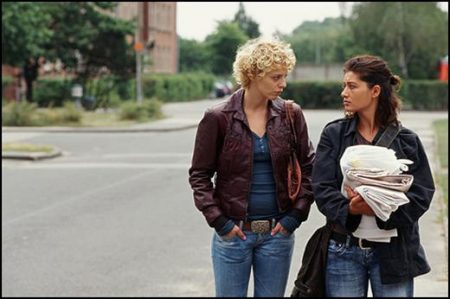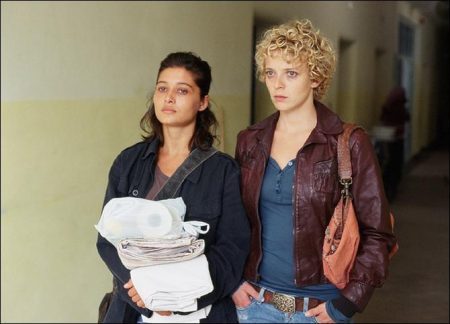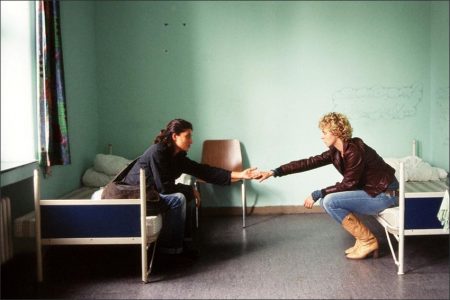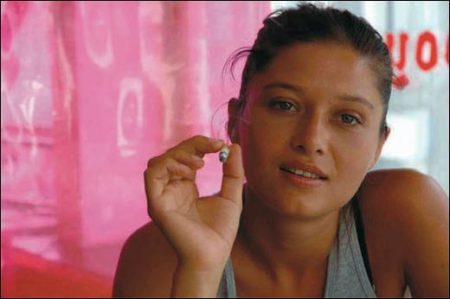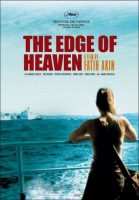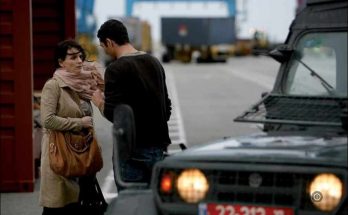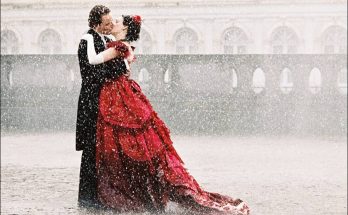The Edge of Heaven Movie Trailer. I put so much into the making of Head-On (Gegen Die Wand), that when I finished, I had no idea what to do next. On my previous films, I had always known what I was doing next before finishing the current one. So there I was in this bad situation not knowing what to do. Ironically, to make matters worse, Head-On became a big success for me. I wasn’t expecting it. As great as it was, success doesn’t make everything easier.
I got even more blocked. I felt pressured to come up with something better than Head-On. I wanted to do better artistically. I had to prove to myself that Head-On wasn’t the best I could do. I relate a lot of things to sports, so I kept thinking that I didn’t want to go out in the first round. I was faced with the challenge of following up Head-On. Being faster than Carl Lewis. Being Ben Johnson.
Becoming A Parent
Becoming a parent had a huge impact on me. My son was born in 2005. Suddenly I had to be more responsible and think about tomorrow. Before I was just a rock ‘n’ roll kind of guy. The birth of my son eased a lot of the creative pressure I was under. It definitely affected my writing. Teaching at a university in Hamburg, sharing my experiences with students, that also helped. Making the documentary Crossing the Bridge also helped ease the pressure. Going to Turkey, meeting all those singers and musicians, that was like therapy.
My Homework
Filmmaking is a big part of my life, but it pales next to issues like birth, love and death. To really grow up, I felt I had to make three films. Call it a trilogy if you want to, but it’s basically three films that belong together because of their themes of love, death and evil. Head-On was about love. The Edge of Heaven is about death. Death in the sense of every death is a birth. Like both death and birth open doors to other dimensions. With The Edge of Heaven, I feel like I’m reaching some other level, but something is still missing that will be in the third film about evil. I just feel like I have to tell something to the end. These three films are kind of my homework, then I can move on. Maybe move on to genre films, film noir, western, even horror.
The Art of Loving
Erich Fromm’s “The Art of Loving” influenced me a lot. I’m fascinated by human relationships. Not just boy meets girl or in a sexual sense, but also between parents and children. All human relationships. I believe that all the wars in the world are the result of not using love in the way that humanity should. I think evil is the product of laziness. It’s easier to hate someone than to love them.
Shooting in Turkey
I finally started shooting on May 1, 2006. The Edge of Heaven was shot in Germany – Bremen and Hamburg, and in Turkey – Istanbul, the Black Sea Coast and Trabzon. The shoot lasted about 10 weeks. For a filmmaker, Turkey is a great place to shoot. Shooting in Germany is much less interesting. It can be attractive, but you have to look hard or create it. The light is extraordinary in Turkey because of its geographic position.
For me, shooting in Istanbul is like shooting in New York. They’re both attractive and cosmopolitan. Each city is a megalopolis. I love to shoot in cities. I’m a big city child. It’s what I know. In The Edge of Heaven, the city of Istanbul is actually a character. Since she doesn’t speak the language, foreigner Lotte becomes lost as she confronts Istanbul. But I also wanted to break the urban image with scenes in the countryside and the coast.
In Between Two Cultures
I have this Turkish background and I have this German background. I was born in Germany, but I’m in between the two cultures. Educated in Europe, but also raised in Turkish by my parents. Turkish culture has always been a part of my life. I traveled to Turkey with my family every summer since I was a kid. Since I’m in between these two cultures, it’s natural that my films are in between, too.
Love-Hate Relationship With Turkey
I have this love-hate relationship with Turkey, a very complicated relationship. I became much more interested in Turkey after I finished school in 1995. I decided to make my first short film there, Weed in 1996. I saw another face of Turkey and I became more and more fascinated. I became more Turkish. With every meter of film I shoot in Turkey, I try to understand the country more and more. But the more I understand it, the more it makes me sad. I hate the politics, the nationalism. Look at what is happening in that country. History repeating itself. The same mistakes again and again. I love that country, but shooting in Turkey takes a lot of energy, tears and blood.
Turkish Bureaucracy
The image of Turkish bureaucracy in The Edge of Heaven isn’t harsh, it’s Kafkaesque. This is not criticism, it’s truth without comment. In the film, when the political activist is arrested in front of Ayten, the happy crowd applauses. The sad thing is that this happened naturally in rehearsal, the extras just automatically clapped. This really only happens when those arrested are considered to be “enemies of the state”. Fascism is alive and well in the streets of Istanbul.
Count the Turkish Flags
There are a lot of Turkish flags seen in The Edge of Heaven. Go ahead and count them. I guess the nationalists will interpret that as a sign of love for Turkey, but I didn’t put one in. They were all already there. I didn’t change the locations. I shot them the way they were. Maybe I went too far, there are so many Turkish flags!
Intelligence Is Sexy
I think intelligence is sexy, so I made the character of Nejat a professor. And a German professor of Turkish origin breaks certain clichés which still exist in Germany. Turks today play a significant role in German culture, politics and science. They’re not just hustling in the streets. For Yeter, education is important enough for her to prostitute herself to provide one for her daughter. Nejat can relate to this desire for knowledge. I liked the irony that when Nejat goes to Istanbul he trades places with a German intellectual running a bookstore.
Education Can Save the World
Literacy, education, plays a profound role in The Edge of Heaven. A book is a key image in the conflict between Nejat and his father. Which book to show? It was a very difficult decision for me. I didn’t want “Siddartha” or “The Hobbit” or anything too full of some parallel meaning.
So I thought I would advertise my friend’s fantastic book. I chose “Die Tochter des Schmieds (The Blacksmith’s Daughter)” by Selim Ozdogan. In regards to the film, the key element is about reading. Reading stands for education. And education is the only thing that can save the world.
Hanna and Tunçel
I imagined this German mother coming to Istanbul looking for her missing daughter. I had this image early on with Hanna Schygulla in mind. I had met her in Belgrade in 2004 and she put a spell on me. I was really into the idea of working with her. Some German journalists have compared my career to that of Fassbinder’s, but I don’t see it at all. I come from the streets, not the theater. Yilmaz Güney is more my background, independent against the norm. What Fassbinder was to Hanna, Güney was similar to actor Tunçel Kurtiz, who I also imagined early on to be part of The Edge of Heaven. But my goal wasn’t to use them as icons from films by Fassbinder and Güney. It would have been vain of me to try and use them like no one else before. I didn’t want my direction to be affected like that. For me, my job is storytelling. And both Hanna and Tunçel fit the idea I had for the parents in the story.
Sampling
The challenge for me as a filmmaker is not to repeat myself. I like to surprise myself and ultimately the audience. I hope that all my films will seem different. I guess we’ll be able to judge that five films from now. When my ideas come, they all come at the same time and they come from a lot of different sources. I even recycle, like sampling in hip-hop music, which I love. They use known bass lines to create something new from something old, and it’s a sort of homage at the same time. Some of the issues in The Edge of Heaven were sampled from Crossing the Bridge. The character of the political activist Ayten was inspired by those Kurdish singers. Here in the West, we don’t have to fight for freedom of speech. But the war for justice is still going on in Turkey.
Passion Is Sexy
Fighting for something with passion is sexy. And I wanted a sexy character for The Edge of Heaven. Ayten is very emotional. She’s street smart and very attractive. She’s a political person. At first, actress Nurgül Yesilçay didn’t feel comfortable with the political background of the character. When she finally agreed, she went all the way. I was fascinated by how well she knew her character. I know a lot of women like Ayten and Nurgül is not one of them. Ayten is sort of a female version of me. She believes in one thing, but later she will surprise herself and change her ideas.
Am I Political?
I want to change the world – am I political? My film hopes the world will change – is it political? Probably more philosophical, but I think everything is political in today’s world. In the times we live in, I think it’s impossible to separate life and politics and art. I believe in the stuff I believe in, but I might change my mind tomorrow. I try not to be dogmatic. Whatever people believe in – religion or politics – everything has limits, everything heads in one direction. I wanted to make a film about going to the other side of all that, going beyond all that. I tried to make this film with some distance, as a viewer from the outside. But it didn’t seem to be possible. Sometimes it’s not the head which directs. I guess it’s a part of me that’s much more irrational, like the heart.
Germany and Turkey
As Germans, Susanne and Lotte represent the European Union, while Ayten and Yeter represent Turkey. Everything that happens between them in The Edge of Heaven is representative of the relationship of those systems. I had some fun with the argument between Susanne and Ayten regarding the European Union. But where I stand is not the point. I wrote this dialogue based on what I have often heard from real people around me.
By the end of the film, German Susanne and Turkish Ayten both experience a profound change in how they see and feel about things. In the bookstore scene at the end where they hug, I noticed a small detail only in the edit. Not far from the women, there are two small flags, one German, the other Turkish. My friend and partner, Andreas Thiel, who passed away during the last week of the shoot, put them there. This stands for something. I guess it’s also a film about the relationship between the two countries.
Fatih Akin: Writer and Director
The Edge of Heaven (Auf der anderen Seite) is Fatih Akin’s fifth fiction feature and made its world premiere in Competition at the 2007 Cannes Film Festival where it won the Best Screenplay Award.
2005’s Crossing the Bridge – The Sound of Istanbul presented the variety of music found in contemporary Turkey.
2003’s Head-On (Gegen die Wand) won the Berlin Film Festival’s Golden Bear, as well as Best Film at the German and European Film Awards.
Akin was born in 1973 in Hamburg of Turkish parentage. While studying Visual Communications at Hamburg’s College of Fine Arts, he wrote and directed his first short in 1995: Sensin – You’re the One! (Sensin – Du bist es!), which received the Audience Award at the Hamburg International Short Film Festival, followed by Weed (Getürkt, 1996). His first feature, Short Sharp Shock (Kurz und Schmerzlos, 1998), won Locarno’s Bronze Leopard and the Bavarian Film Award for Best Young Director.
Filmography
2007 The Edge of Heaven (Auf der anderen Seite)
2005 Crossing the Bridge – The Sound of Istanbul (documentary)
2003 Head-On (Gegen die Wand)
2002 Solino
2001 Wir Haben Vergessen Zurückzukehren (documentary)
2000 In July (Im Juli)
1998 Short Sharp Shock (Kurz und Schmerzlos)
About the Cast
Nurgül Yesilçay as Ayten Öztürk
One of Turkey’s most admired young actresses, Nurgül Nurgül was born in Afyon and studied drama at the Anatolia State Conservatory and the Eskisehir University Drama School. Her stage performances include Ophelia in Shakespeare’s “Hamlet” and Blanche DuBois in “A Streetcar Named Desire”. She was recently seen in Baris Pirhasan’s Adam and the Devil (Adem’in Trenleri), presented at the 2007 Istanbul Film Festival.
Her other film credits include the Atif Yilmaz’s 2005 comedy drama Borrowed Bride (Egreti Gelin), Yucel Yolcu’s Sleeping Beauty segment of 2005’s Istanbul Tales (Anlat Istanbul), Haluk Özenç’s 2002 comedy adventure Runaway Mummy (Mumya Firarda) Semir Aslanyurek’s 2001 historical drama Waterfall (Sellale) and Omer Vargi’s 1999 cult comedy Everything’s Gonna Be Great (Hersey Çok Güzel Olacak). Nurgül reprised her starring role in Abdullah Oguz’s 2003 film Asmali Konak: Hayat, based on the popular TV series.
Baki Davrak as Nejat Aksu
Baki Davrak made his debut performance in Kutlug Ataman’s 1997 German Turkish drama Lola and Bilidikid. He was seen in Harald Bergmann’s 2006 film Brinkmanns Zorn. His other film credits include Willem Droste’s Past By Night, Ulli Schüppel’s Planet Alex and Thomas Arslan’s Dealer, a hit at the 1999 Berlin Film Festival. Baki is an accomplished theatre actor and he also frequently appears on TV in series such as “Kommissarin Lucas”, “Wolffs Revier”, “Eva Blond”, “Der Puma” and “Tatort”. He starred in Stefan Holtz’s 2005 TV movie “Meine verrückte türkische Hochzeit“. Baki is also an author and a collection of his poetry has recently been published.
Nursel Köse as Yeter Öztürk
Nursel Köse starred in Buket Alakus’ 2002 film Anam (My Mother) as a mother trying to save her teenage son from the drug scene. She was recently seen in Alakus’ In Another League (Eine Andere LigaI), a teenage drama which won the audience award at the Max Ophüls Festival. Her other film credits include Anno Saul’s Kebab Connection and Hark Bohm’s Yasemin, the award-winning 1988 film about a traditional Turkish family in Germany. Nursel’s television work includes the 2005 Turkish miniseries “Sessiz Gece” and Ruth Olschan’s 2003 German TV movie “Savannah”.
Hanna Schygulla as Susanne Staub
An icon of European cinema, Hanna Schygulla did not know that she would ever become a professional actor until a girlfriend invited her to join a performing arts course in Munich. There she met a young actor: Rainer Werner Fassbinder. They never finished school, but instead, founded their own theatre: the Anti Theatre, began filming, and became one of the most famous and productive couples in German cinema (Effie Briest, The Marriage of Maria Braun, The Bitter Tears of Petra Von Kant, Lili Marleen and many others).
She has also worked with such luminary directors as Andrej Wajda (A Love in Germany), Wim Wenders (False Move), Volker Schlöndorff (Circle of Deceit), Margarethe von Trotta (Sheer Madness), Jean-Luc Godard (Passion), Ettore Scola (Il Mondo Nuovo), Marco Ferreri (The Future Is Woman, The Story of Piera, for which she won the Best Actress Award at the 1983 Cannes Film Festival), Kenneth Branagh (Dead Again), Amos Gitai (Promised Land) and Bela Tarr (Werkmeisters Harmonies). Hannah Schygulla also directed her own film, 1979’s Traumprotokolle, an experimental revue of night dreams, which is now part of the film collection at New York’s Museum of Modern Art (Moma). She has recently begun to work with a new generation of filmmakers such as Till Franzen (Die Blaue Grenze), Hans Steinbichler (Winterreise) and Fatih Akin (The Edge of Heaven).
Tunçel Kurtiz as Ali Aksu
Kurtiz was born in 1936 in Bilecik, Turkey. With a career spanning over 40 years and dozens of films, Tunçel Kurtiz has become one of Turkey’s most beloved actors. He can currently be seen in the Turkish TV series “Kara Duvak” and recently starred in the mini-series “Haci”. Film credits include starring roles in seminal Turkish director Yilmaz Güney’s Duvar and Umut, Ömer Kavur’s Akrebin Yolculugu / Clock Tower, Reis Celik’s Hosçakal Yarin, Dervis Zaim’s Tabutta Rövasata / Somersault in a Coffin, Zeki Ökten’s Sürü, Hiner Saleem’s Vive La Mariee, Erden Kiral’s Kanal and Peter Brook’s film version of The Mahabharata. He has won numerous awards, including Best Actor at the 1986 Berlin Film Festival for Shimon Dotan’s Hiuh Hagdi / The Smile of the Lamb and Best Supporting Actor at 1994’s Antalya Festival for Tunca Yönder’s Bir Ask Ugruna. Recent film credits include Carlo Mazzacurati’s A Cavallo Della Tigre / Jailbreak and Semir Aslanyürek’s The Waterfall (Sellale).
Patrycia Ziolkowska as Lotte Staub
Patrycia Ziolkowska was featured in Fatih Akin’s Solino and Buket Alakus’ Anam. She has appeared in the German TV series “Stubbe“, “Nikola”, “Tatort”, “Schimanski” and “Der Ermittler”. An accomplished theatre actor, Patrycia has had leading roles for the past several years at Bonn’s Schauspiel in “Dreigroschenoper”, “Die Frau vom Meer”, “Die Jungfrau von Orleans”, “Woyzeck” and “Der Streit” and has appeared in leading theatres throughout Germany.
Happening upon a no-nonsense Turkish prostie, Yeter (Nursel Kose), he proposes she moves in with him if he matches her hooking income. Under pressure to quit her job by two fundamentalist Turkish thugs, Yeter agrees. Turns out that, back in Turkey, Yeter has a 27-year-old daughter, Ayten (Nurgul Yesilcay), who thinks her mom works in a shoe shop. When Ali is hospitalized after a heart attack, Yeter forms a close relationship with the quiet Nejat, who accepts his father’s patriarchal lifestyle.
However, viewers have already been warned, in pic’s opening title (“Yeter’s Death”), that tragedy is waiting round the corner. Sure enough, Yeter is accidentally killed by Ali in an argument. As Ali is incarcerated in a German jail and Yeter’s body is shipped home, story shifts to Istanbul, where Nejat has bought a German-language backstreets bookshop. Between times, he’s searching for Ayten, to finance her education as a form of reparation.
As another audience warning (“Lotte’s Death”) appears on screen 40 minutes in, we meet Ayten, a political activist using the alias Gul Korkmaz who’s on the run from the authorities. Fleeing to Germany, she ends up penniless in Hamburg where she’s befriended by college student Lotte, daughter of comfy, middle-class Susanne (vet Hanna Schygulla). Lotte and Ayten become lovers, setting in motion a complex series of criss-crossing events that changes the lives of the survivors for ever as the story shifts back to Turkey.
Pic has a lean, almost procedural style, in which every scene and line of dialogue counts. Akin doesn’t try to hide the plot’s coincidences or Swiss watch-like precision, which is given human resonance by the flawless playing of the six leads. Only one scene, a political face-off by Ayten and Susanne, rings awkwardly.
By the time the second seg segues into the final one (film’s German title, “From the Other Side”), helmer’s long-burn approach packs a considerable emotional wallop in a quiet, inclusive way.
Veteran Turkish actor Kurtiz, who’s almost a national monument back home, dominates the early going with his frisky but deeply traditional Ali. Distaffers take over the running in the second half, with the utterly convincing Yesilcay (so good in the very different role of a quiet Moslem bride in recent Turkish pic “Adam & the Devil”) and Ziolkowska (from Akin’s “Solino”) as the lesbian lovers. Schygulla’s low-key perf grows more slowly, bringing a reconciliatory glow to the final reels.
Akin’s cultural ease with both countries shows in the shooting, spread between Bremen, Hamburg, Istanbul and Trabzon. Good-looking but never gratuitously glossy lensing by Rainer Klausmann (“Solino,” “Head-On,” “Downfall”) is an extra plus, as is the liberating score by Shantel (aka Stefan Hantel).
The Edge of Heaven (2007)
Yaşamın Kıyısında
Directed by: Fatih Akın
Starring: Nurgül Yeşilçay, Baki Davrak, Tuncel Kurtiz, Hanna Schygulla, Patrycia Ziolkowska, Nursel Köse, Elçim Eroğlu, Nejat İşler, Asuman Altınay, Turgay Tünülkü, Erkan Can
Screenplay by: Fatih Akın
Production Design by: Sırma Bradley
Cinematography by: Rainer Klausmann
Costume Design by: Katrin Aschendorf
Music by: Shantel
Distributed by: Anka Film, Corazon International, Strand Releasing
Release Oate: September 27, 2007 (Germany), October 26, 2007 (Turkey)
Views: 190
